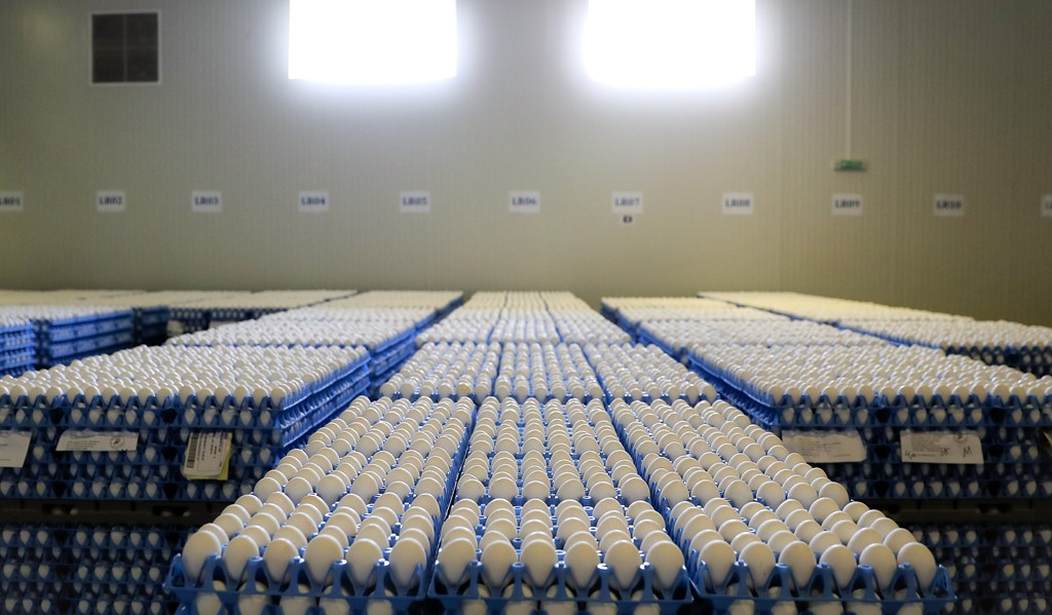Egg prices are soaring and there are two schools of thought as to why it’s happening. Grocery shoppers tend to point a finger at Bidenflation and grouse that eggs, like everything else in their cart, have gone up in price. Farmers and business owners tend to say that it’s the bird flu epidemic and the rising costs of producing eggs.
In Colorado, the Denver Post reports that there is an egg shortage on grocery store shelves. The state’s egg industry blames nationwide outbreaks of avian influenza, consumer demand, and a new state law. The new law requires all eggs sold in grocery stores and produced on Colorado farms to be cage-free. So, demand for cage-free eggs is skyrocketing after the law went into effect on January 1. There aren’t enough people who produce cage-free eggs to meet the demand. Farms with 3,000 or fewer egg-laying hens are exempt from the new rule:
Last week, Scarborough noticed empty store shelves in his Western Slope community. Grocers with eggs in stock placed limits on the amount customers could purchase.
He predicted the tight supply could last through 2023. “It’s not going to get a lot better this next year.”
Hen flocks across the nation began suffering outbreaks of avian flu last February. Nearly 40 million hens have died or been euthanized. That’s a 5% drop in flock size since last November, compared to November 2021, according to to the US Department of Agriculture. The department has confirmed avian flu case in 46 states, including Colorado, one of the hardest hit states.
The lingering bird flu outbreak, combined with the rise in prices of food, fuel, and labor costs, have led to egg prices more than doubling over the past year. The national average price of a dozen eggs was $3.59 in November. That’s up from $1.72 the previous year. This really puts pressure on those who rely heavily on eggs, like bakeries, restaurants, and other food producers. Though some price increases are beginning to slow a bit due to gas prices easing through the fall, grocery prices that were 12% in November are driving inflation higher. Egg prices are up more significantly than other foods, including chicken or turkey, because egg farmers were hit harder by the bird flu.
There may be some good news on the horizon. Commodity researcher Urner Barry reports that Midwest large eggs, the commodity’s benchmark price, fell to $4.63 a dozen last Friday. That’s down from a record high of $5.46 a dozen in December. That is still ridiculously high but consumers will take any break they can get these days. I’m old enough to remember when eggs went on special for 99 cents a dozen. Good times, good times.
A University of Arkansas agricultural economist also reports that relief in prices may be coming.
Jada Thomson, a University of Arkansas agricultural economist, said there may be some relief coming in egg prices in the next couple months because egg farmers have been steadily replacing their flocks lost to bird flu last year and demand will ease a bit now that people are done with their holiday baking.
But she said bird flu remains a wildcard that could still drive prices higher if there are more sizeable outbreaks at egg farms.
Farmers are doing all they can to limit the spread, but the disease is easily spread by migrating wild birds and the virus can be picked up on clothing or vehicles.
“But there are some things that are just outside of our control,” Thompson said. “You can’t control nature sometimes.”
It’s difficult for businesses to find egg substitutes. The shortages and price increases mean their products and restaurant offerings rise in price, too. Business owners struggle to keep prices low for customers. And, they want to keep their businesses open.
Any decrease in egg prices would be welcome at Patti Stobaugh’s two restaurants and two bakeries in Conway and Russelville, Arkansas, because all of her ingredients and supplies are more expensive these days. For some of her baked goods, Stobaugh has switched to a frozen egg product that’s not quite as pricey, but she’s still buying eggs for all the breakfasts she serves.
A case of 15 dozen eggs has gone from $36 to $86 over the last year, but flour, butter, chicken and everything else she buys is also more expensive. Stobaugh said that has her “hyper vigilant about every little item.”
She’s already increased her prices 8% in the past year, and she may have to soon increase them again. It’s a delicate balance of trying not to make it too expensive for people to eat out and hurting sales, but she doesn’t have much choice while trying to provide for her 175 employees.
“We have a lot of employees that work for us and we’re responsible for making payroll every week and supporting their families. We take that very seriously. But it certainly has been tough,” Stobaugh said.
Joe Biden has screwed up a lot of things since he took office. Most of all, he torpedoed an economy poised to recover from the pandemic in a strong way and Bidenflation has run rampant. No American can escape it. Here’s hoping there is a little relief coming our way soon.









Join the conversation as a VIP Member